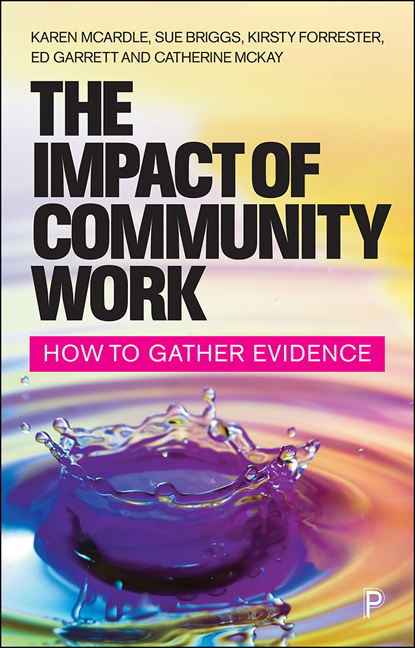9 - Narrative Inquiry
Published online by Cambridge University Press: 10 March 2021
Summary
Introduction
Narrative inquiry is a method of finding the stories we wish to tell others about the impact of the work we do in the community. It is relevant to community work, because the method is highly accessible to the respondents. It seeks deep and rich accounts of experience and is consistent with the values of community work, in that it seeks to assist participants to frame their experience rather than asking them interview questions. It is the study of the stories people tell about their lives. Its purpose is to see how participants in interview impose order on the flow of experience to make sense of events and actions in their lives (Riessman, 1993). People in general, in our experience, like to tell stories about their lives. People's stories tell us about their identity, who they are and who they have become through experience. Narratives are case studies in the context of gathering evidence.
The reason narrative inquiry is so consistent with the values of the community work profession is that it does not lead the participant in terms of what to think about or consider. In interviews, you can ask about confidence and self-esteem, but this may not be of interest to respondents, nor may they conceptualise in this way. In narrative inquiry, participants choose what to discuss and you can interpret what they say to answer your questions.
Truth
There is, however, a big question about the truth of what they say. Stories are representations of what people want to communicate, including the identity they wish to portray, as well as the impact they wish to have on the listener. I could tell you a story about the time I fell off my horse and had a traumatic brain injury that put me out of action for a good five years. At the time of telling in the first year, I would have emphasised the pain and distress this caused me and the fear I experienced. Now, ten years after the event, I will tell you about how it sparked a sense of resilience in me, which makes me able to cope really well with any other form of illness, such as the pneumonia I picked up on holiday in Peru. Both stories are true, but time has given me the ability to reflect on events, so the stories are different.
- Type
- Chapter
- Information
- The Impact of Community WorkHow to Gather Evidence, pp. 151 - 162Publisher: Bristol University PressPrint publication year: 2020



